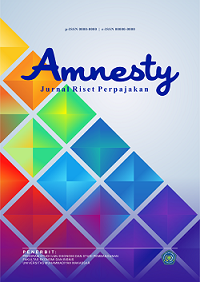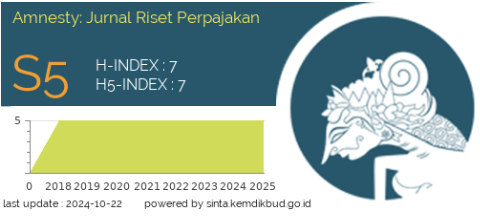Implementation of Electronic Fiscal Tools (EFD) in Increasing Restaurant Taxpayer Compliance and Restaurant Tax Revenue in Bandung City
DOI: https://doi.org/10.26618/jrp.v7i2.16556
Electronic Fiscal Tools (EFD), Compliance, Restaurant Tax
Abstract
This research is motivated by various problems related to the implementation of Electronic Fiscal Tools, including network problems. This research aims to determine the extent to which the implementation of the Electronic Fiscal Tool (EFD) has increased restaurant taxpayer compliance and restaurant tax revenue in the city of Bandung. The theory used to measure taxpayer compliance is Nurmantu's theory, while to measure effectiveness the theory of Minister of Home Affairs Decree Number 690,900,327 of 1996 is used. Researchers use a case study approach, which is a type of qualitative research, as an important part of the research process. The object of this research was carried out at the Bandung City Regional Revenue Agency Office and the restaurant taxpayer's place. In collecting data, researchers use primary and secondary data such as interviews, observation and documentation. The results show that in the implementation process of the Implementation of Electronic Fiscal Tools (EFD) in Increasing Restaurant Taxpayer Compliance and Restaurant Tax Revenue in the City of Bandung it can be said to be quite optimal. Although there are still many shortcomings or obstacles faced by the Bandung City Bapenda in the first year of using the Electronic Fiscal Tool (EFD)References
Azima, f. (2015). Process for Determining Regional Income Targets. Jakarta: National Library of the Republic of Indonesia. Retrieved from http://repository.ut.ac.id/2655/1/41763.pdf
Fortuna, CD, & Setiadi. (2022). ANALYSIS OF THE INFLUENCE OF FORCED LETTERS ON TAXPAYER COMPLIANCE WITH INDIVIDUAL TAX INCOME. JIMA Accounting Student Scientific Journal , 81.
Public Relations of the city of Bandung. (2023, April 11). Increasing Regional Tax Potential, Bandung City Government Installs DKE at 1,000 Points . Retrieved from https://www.bandung.go.id: https://www.bandung.go.id/news/read/7871/angkat-potential-pajak-region-pemkot-bandung-angkat-dke-di- 1-000
Kurniawan, A., Purwanti, M., & Lidiawati, E. (2017). Taxpayer Understanding, Tax Socialization and Taxpayer Compliance. STAR – Accounting Studies & Research, Vol XIV , 5. doi:https://doi.org/10.55916/jsar.v14i1.31
Mahfudh, Saleh, H., & Yusuf, M. (2022). ANALYSIS OF INCREASING REGIONAL ORIGINAL INCOME. Gowa: Almaida's Heritage.
Mubarok, A. (2017). SEVERAL FACTORS INFLUENCE THE REALIZATION OF STUDY TAX REVENUE AT THE PRATAMA SERPONG TAX SERVICES OFFICE. open journal unpam , 532.
Octaviana, DR, & Ramadhani, RA (2021). HUMAN NATURE: Knowledge (Knowladge), Science (Science), Philosophy and Religion. Tawadhu Journal , 151.
PT. Cartenz. (2023). Electronic Fiscal Tool (EFD). Retrieved from https://cartenz.co.id/efd/: https://cartenz.co.id/efd/
Sihombing, S., & Sibagariang, S.A. (2020). TAXATION (Theory and Application) . Bandung: WIDINA BHAKTI PERSADA BANDUNG .
Sugiyono. (2019). Quantitative, Qualitative and R&D Research Methods. Bandung: Alphabeta.
Talondong, S., Morasa, J., & Tangkuman, S. (2018). ANALYSIS OF THE EFFECTIVENESS AND EFFICIENCY OF REGIONAL TAX REVENUE OF NORTH SULAWESI PROVINCE FOR THE 2013-2017 PERIOD. Journal of Accounting Research .
Tiara, S., & Wibowo, MR (2018). THE INFLUENCE OF RESTAURANT TAX REVENUE ON REGIONAL ORIGINAL INCOME AT THE REGIONAL TAX AND RETRIBUTION MANAGEMENT AGENCY OF MEDAN CITY. Muhammadiyah University of Surakarta .




